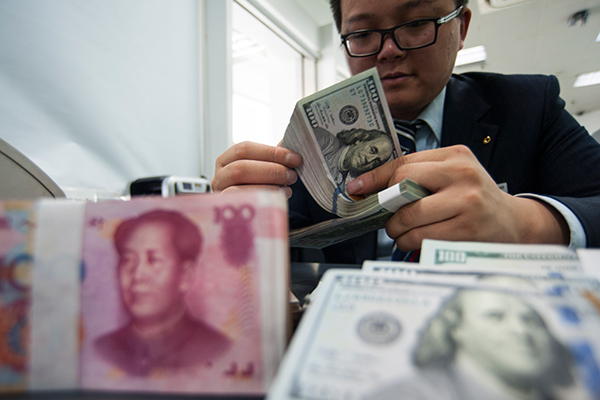Media Report

- The Wall Street Journal comments: "Donald Trump says he'll declare soon after he takes office that China is a currency manipulator because it is devaluing the yuan against the dollar. He may want to rethink that. These days China is intervening in the capital markets to prevent the yuan from going into free fall. The currency is now close to an eight-year low, down 12% from its peak in January 2014. One irony is that Mr. Trump is contributing to the yuan's fall with his critical tweets about China, as traders see economic trouble ahead. The Chinese government has tried to slow the yuan's fall by selling dollars—in essence manipulating the currency in the opposite direction of Mr. Trump's accusation. As a result, China's reserves have shrunk to $3.05 trillion in November from $3.99 trillion in June 2014...Hence Beijing's preferred course of action since August 2015 has been to allow market forces to gradually erode the yuan's value...If Mr. Trump wants a new deal with China, our advice is to focus on negotiating a pact for stable exchange rates while aiming to change abusive Chinese practices"
- The Diplomat comments: "Earlier this week, U.S. Senator Marco Rubio (R-FL) introduced a bill in the Senate Foreign Relations committee that proposes punitive sanctions against China over its activities in maritime disputes in the East and South China Seas. The bill, called the 'South China Sea and East China Sea Sanctions Act of 2016'...proffers a plan to sanction Chinese individuals and entities 'that participate in Beijing's illegitimate operations in the South China Sea and East China Sea,' according to a release by Rubio's office...The core purpose of this bill is to constrain Chinese behavior by setting out the conditions under which punitive U.S. sanctions would take effect against Chinese individuals and entities. Even though the July 12 ruling is cited as an important precedent, the overarching objective isn't to uphold UNCLOS — which the U.S. hasn't ratified — or encourage respect for freedom of navigation and overflight among all South China Sea claimants. What's still unclear is the extent to which this bill is intended as muscular legislative messaging or a serious attempt at reforging U.S. policy"
- Reuters reports: "China's imports grew at the fastest pace in more than two years in November, fueled by its strong thirst for commodities from coal to iron ore, while exports also rose unexpectedly, reflecting a pick-up in both domestic and global demand. The upbeat data adds to signs of a modest industrial recovery in the world's largest economies, even as China and other Asian exporters brace for a potential trade war once protectionist U.S. President-elect Donald Trump takes office. 'The improvement reflects a strengthening in global demand, with recent business surveys suggesting that developed economies are on track to end the year on a strong note,' Julian Evans-Pritchard, China economist at Singapore-based Capital Economics, said in a note. 'But while global demand has recovered somewhat recently, lower trend growth in many developed and emerging economies means that further upside is probably limited. [Evans-Pritchard warned]"
Calendar
- 2016-12-07 Trump picks Iowa Gov. Terry Branstad — a ‘friend’ of China’s leader — as Beijing ambassador
- 2016-12-06 China Seeks ‘Strategic Composure’ in Trump Era of Diplomacy
- 2016-12-05 Trump, Taiwan and China: The Controversy, Explained
- 2016-12-04 Trump Camp Scrambles To Defend Diplomatic Blunder Over China And Taiwan
- 2016-12-02 China Seizes Opening in U.S. Backyard as Trump Upends Policy
- 2016-12-01 China says new North Korea sanctions not meant to harm 'normal' trade
- 2016-11-30 China military says it's seriously concerned by Japan-South Korea pact
- 2016-11-29 China to clamp down on outbound M&A in war on capital flight
- 2016-11-28 Antibiotic-resistance genes in Beijing’s smog are nothing to worry about, Chinese officials say
- 2016-11-25 Trump will pursue 'regional hegemony' in South China Sea: Chinese academic...
News
- Reuters Chinese trade data shows signs of industrial recovery
- The Wall Street Journal China's Banks Are Hiding More Than $2 Trillion in Loans
- The New York Times Michael Jordan Owns Right to His Name in Chinese Characters, Too, Court Rules
- The Associated Press Manila Says Will Not Help US on Patrols in South China Sea
- Reuters Trump's choice of China envoy a positive sign for ties, Xinhua says
- The Associated Press China Trade in November Rebounds From Slump
- Bloomberg Why Markets Stopped Worrying About China's Dwindling Foreign Cash Pile
- The Financial Times US interest rate rises set to expose China's frailties
- Bloomberg China Set to Rescue Australia Economy at Just the Right Time
- Aljazeera Apple deflects blame after iPhones catch fire in China
- The Wall Street Journal Model Farm in China to Highlight Xi's Ties to Iowa, Donald Trump's Beijing Envoy
- The Financial Times China's statistics chief admits some economic data are false
- CBS News Who's the bigger "currency manipulator" -- China or Taiwan?
Commentary
- The Wall Street Journal Trump's Chinese Currency Manipulation
- The Diplomat US Sanctions Against China Over the East and South China Seas: A Serious Proposal?
- Foreign Policy Rubio Calls for Sanctions on Beijing for South China Sea Antics
- Fortune China's Credit Binge Has Driven Its Banks to Hide $2 Trillion in Loans
- The New York Times: Sinosphere China Pushes Back on Michael Flynn's 'Radical Islamist' Remarks
- The Washington Post: Opinions Americans should stop using Taiwan to score political points against Trump and China
- The Guardian: Opinion The way forward for the west? Help China and wave the rulebook at Russia
